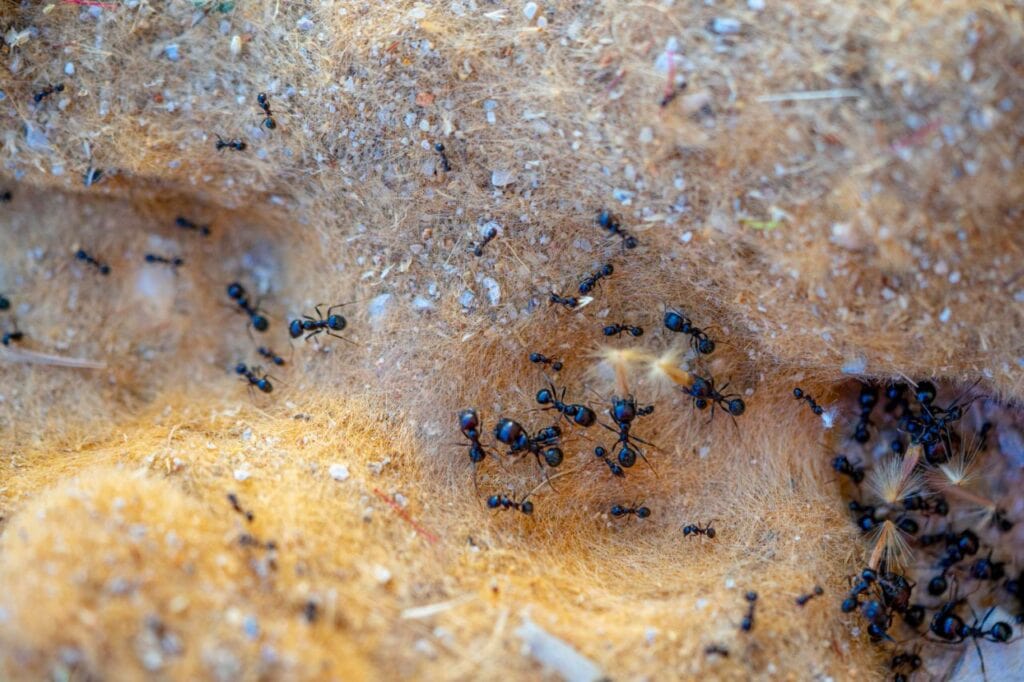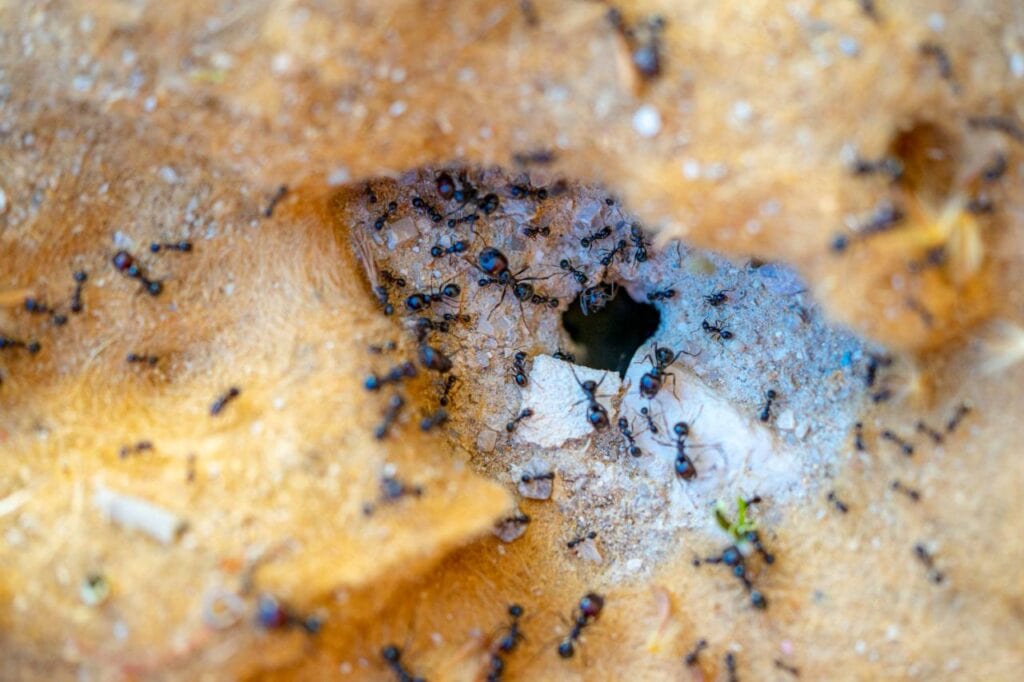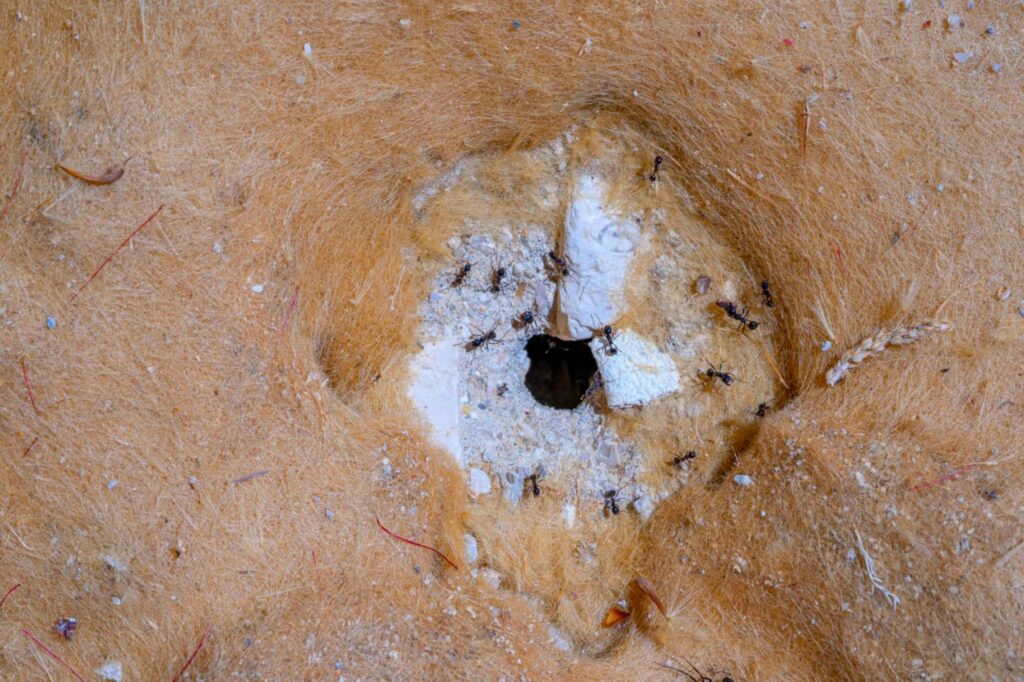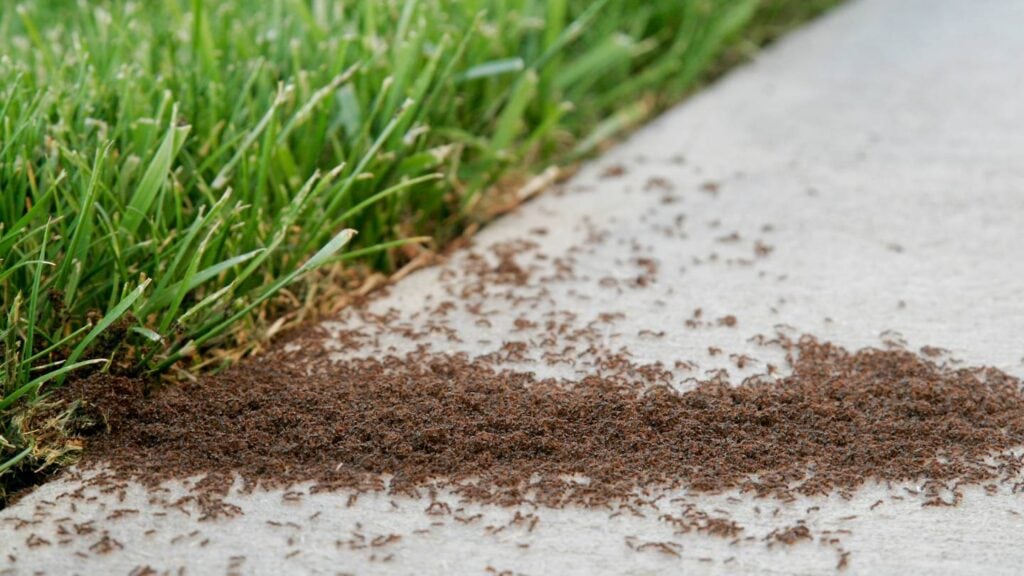Infestations of ants can be a continuous problem for homeowners in Australia since they not only cause damage to the property's structure but also threaten the individuals' health.
You can hire a professional insecticide or try some do-it-yourself strategies to eliminate ants from your home or yard. Before bringing in the benefits, most people would give ant control a shot alone. But if you want to help eliminate ants and ensure they don't come back, hiring a professional is best!
If you seek advice on getting rid of ants, we have included some common do-it-yourself treatments and explained why they are less effective than a professional treatment.
Signs Of An Ant Infestation
Ants may be little, but when they decide to make your house their home, they can cause much trouble. The key to successful intervention and prevention is recognising the early warning symptoms of an ant infestation. Important signs to keep an eye out for include these:
A Literal Ant Trail
Do you have any idea how many anthills you have in your home? This recognisable phenomenon clearly shows a persistent ant invasion. Ants constructing elaborate paths within your house usually mean they've found a food supply and are following a pheromone trail to get there. The ant colony uses this action as strategic communication to disseminate information about where to find food.
It is necessary to take a holistic strategy to address this matter. If you want a long-term cure, you must disrupt the entire colony, not just the visible ants. Treating just those may work temporarily. It becomes easier to stop these hardworking insects from finding the food supply again if someone intervenes at the colony level.
Clicking Sounds
Termites can make unmistakable clicking sounds inside your walls, which can be quite an unsettling audio experience. Termites make two distinct kinds of noises, and we can learn more about their behaviour by listening to both. When you hear a slightly less harsh clicking sound, it's probably termites busy working their magic on the wood inside your walls.
Their silent consumption is like a symphony, a gentle but foreboding reminder of the possible harm that is happening. Conversely, termites that make more pronounced tapping or clicking noises are trying to tell you something different—that they feel threatened. Their distinctive language—the repetitive pounding of their heads against the walls—warns that termite control in your home is an emergency.
'Mudding' Mud Tubing
One of the primary goals of white ants is to ensure that their internal nest cavities are as secure, dark, and humid as ever. Additionally, they construct tunnels out of a substance resembling mud to conceal themselves. These tubes that resemble mud may prove they were attached to brick foundations, trees near your home, or other wooden buildings.
Crawling Ants In Leftover Meal
The indiscriminate appetite of ants is shown when you find them in food you inadvertently left out. This is a telltale symptom of an ant infestation. Ants will invade any food source they find, as they are culinary opportunists. These hardworking invaders in your edibles are a sure sign that pests have made your house their new home. It is crucial to keep your living space spotless to prevent their reappearance, so be sure to clean thoroughly. This also applies to pet care; keeping an eye on your pet's feeding bowls is crucial to guarantee that ants don't contaminate their food or hygiene.
Ants Living Within Your Trees
The trees in your backyard require your undivided attention, even though it goes against common sense. To the surprise of many, ants don't just live in underground caverns; they also like to make their homes in the rotting limbs of trees. Pay close attention if you see many ants moving up and down the trees.
The necessity for intervention is highlighted by this behaviour, which indicates a possible nesting site. Get in touch with the exterminators in your area if you want to get rid of these arboreal ant problems. Their knowledge and experience can help you create a personalised treatment plan that effectively reduces the likelihood of ant infestations in and around your house.
Ants Prowling Around Your House, Either Inside Or Outdoors
The presence of live ants can quickly and easily identify an ant infestation. The ants you see outside your house will eventually make their way inside. Large mounds and groups of ants outside are telltale signs of an infestation, as are more ants than the normal few you find in your garden. If you don't treat these huge outside ant colonies now, the ant population will increase and invade your home.
The explosion of ant colonies outside should be enough to make anyone nervous if they find ants inside their home. While over-the-counter ant sprays may eliminate the stragglers, they won't wipe out the entire colony. The ant problem will only disappear once you have a professional exterminator to deal with the outside ant colony.
Ant Mounds In Your Yard
The presence of a large number of ants in or around your house is indicative of a possible ant infestation. Don't write off the relevance of ant colonies, big or small, just because they're outside. Although these ant colonies don't seem like much on the outside, they could be hiding hundreds—if not thousands—of ants waiting to invade your home. For example, weather or air pressure changes can be outside influences that cause them to invade your house. You must be vigilant and act aggressively to protect your home from this imminent danger.
Plaster Architraves And Skirting Are Quickly Damaged

The activity of white ants within the walls and cavities of a house causes damage to wooden structures from the interior to the exterior. Cracks will appear, or you will notice that particular places, such as skirting boards, plaster walls, and architraves, are easily damaged, broken, or cracked with no impact. This is because the decay of the wood fibres and cellulose causes these areas to become more susceptible to harm. This is a clear sign that termites are present in Australia.
Floor, Window Ledge, Or Outside Entrance Insect Wings
Seeing old ant wings among the dust and trash in your home is a symptom of an ant infestation, according to several companies and websites; nevertheless, it is more probable that you are dealing with termites than ants.
Termite females typically take flight in November and December, particularly during periods of extreme humidity, in search of a suitable colony.
You might find their old wings lying around your home because that's what they do after they're done. This is not an anthill! But don't panic; this only sometimes indicates termites are the problem. Contact our staff to arrange an onsite termite examination to alleviate any concerns.
If you have also observed any "white ants," it is highly recommended that you contact a specialist because it is possible that you are dealing with a termite infestation.
Methods For Getting Rid Of Ants
One of the most significant issues in Brisbane is the presence of ant infestation. All your hard-earned food will end up in the trash can because of these annoying pests. On top of that, they harm your garden plants, your property, and your skin with their stinging bites. But eliminating an ant infestation is no easy feat. Consequently, how would you react if these unwanted guests appeared at your doorstep? Now is not the time to go out and buy poison; simple, at-home remedies will accomplish the trick.
You can handle ant problems in Brisbane naturally in some ways. To help you out, we have compiled a list of all-natural treatments that have been tried and true.
Chalk Is An Effective Ant Repellent
There are many uses for chalk beyond only writing on blackboards, even though it is becoming less used in classrooms due to developments in digital error learning. Chalk is so popular because it works wonders as an ant repellant. No ant will dare to cross your freshly drawn chalk line. This chalky substance interrupts the ant's pheromone trail, their means of communication.
So, to reduce the amount of ants entering your residence, you can break their trail by creating a chalk line. You can achieve better results using chalk powder by drawing a line around your property or the primary points of entry, such as the cupboards and the kitchen door.
White Vinegar Will Repel Ants
As a natural pesticide, white vinegar can eliminate ants naturally. You may readily find this potent ant repellant at any store near you. Ants' pheromone trails can be destroyed by vinegar, which hampers their mobility. However, in order to lower its concentration, it must be mixed with water. These bugs lose all sense of direction the second the solution is sprayed on them. Ants will also begin to avoid the area if they detect the solution's unpleasant odour. To keep these pests at bay, spray vinegar into all key entrances around your property.
Brew Fresh Coffee Grounds
A cup of coffee the first morning will help keep ants away. To keep ants away from the affected area, use the grounds from your morning brew and sprinkle them over the area. Since the effectiveness of coffee grounds diminishes with drying, this short-term solution will require repetition or combination with another treatment.
Because ants despise the aroma of the coffee, they will try to avoid the area where you keep your coffee grounds. Until you can concoct a remedy that kills the ants and stops them from returning, this strategy will keep them from returning to the affected region.
Cinnamon Also Repels Ants
Discover a natural solution to ant problems using cinnamon essential oil. Many Australian homes use it since it is one of the best insect repellents on the market. Ants won't dare enter your home after smelling that pungent odour. Therefore, spraying this oil and water can keep ants away from your home. The ants will lose their sense of direction after you spray the solution on them since it will obliterate their chemical mark. So there you have it, a cinnamon oil method to keep ants at bay.
Fresh Garlic
Most of us have this small plant on hand, and you might already know it works wonders as an ant repellant. To make ants flee, peel a couple of cloves and put them near the area where you've observed them. Another option is to whip up a garlic spray—it will keep ants at bay like magic.
Ants Are Killed And Repelled By Soap And Water
Try using soap and water if you're dealing with a termite infestation. This technique makes killing and removing ants from the home easy. The ant dies from suffocation as a result of the soap coating it. The ants cannot communicate with one another because the soap's scent removes their pheromone trail. That renders ants aimless, facilitating their extermination. Additionally, the odour dissuades these pests. But before you use this solution, add a generous amount of liquid dish soap to strengthen it and increase its effectiveness.
Baking Soda kills Ants
When it comes to common insect pests, baking soda is a popular natural remedy. When it comes to natural remedies for ant problems, this is among the best. Also, there aren't many ingredients needed to make a baking soda bait, and it's really easy to make.
After you've combined powdered sugar with baking soda, set the bait in the area where you noticed the ant activity. Anthracnose, a fragrance produced by powdered sugar, entices ants to approach and consume the bait. Baking soda, on the other hand, is effective because it kills ants by interfering with their bodily processes. Sugar ants can also be effectively eliminated in this manner.
Ants Are Repulsed And Killed By Cayenne Pepper
If you have cayenne pepper on hand, you now own a remedy for ant infestation. Ants are scared away by the intense aroma and flavour of cayenne pepper. You can get rid of ants and their trails by scattering cayenne pepper powder in the areas where you've found them. When you're done, their molecular signals will be gone. The ant colony's survival depends on this signal. Another effective method for eliminating ant problems is to mix turmeric powder, cayenne pepper, and water into a powerful solution.
Diatomaceous Earth
If you live where ant activity is a problem, you can dust the area with diatomaceous earth. The first step is to sprinkle this powder around the baseboards and entryway.
The trick is to sprinkle diatomaceous earth over the entire colony, as it is potent enough to destroy a small colony in a few days. The trick is to locate all of the anthills, so if you have a big infestation, it can take longer for this strategy to work.
One ingredient in rock that diatomaceous earth includes is silica. Ants become dehydrated and die when this silica enters their bodies and absorbs water.
Conclusion
In Australia, ant colonies can do a lot of damage to people and their property. To keep ants away, people should be aware of early warning signs like an ant trail, clicking sounds, mud tubes, and ants crawling in old food. Ants make complicated paths inside their homes and use them to talk to each other and find food. To get rid of the whole colony, not just the ones that can be seen, you need to take a comprehensive method.
Termites also make clicking sounds inside walls, which is a sign that they need to be controlled. To hide, they dig mud tunnels that lead to brick foundations, trees, or other wooden buildings where they are connected. Ants will also eat old food, which means they have moved into your home. Keep your living areas spotless and clean all the way through to keep ants away.
Ants can live in dead tree branches and make nests there, so trees should be kept clean. Get personalised treatment plans from local exterminators to lower the chances of getting ants in and around your house.
If you see living ants, big mounds of ants, or groups of ants outside your house, you know you have an ant problem. There may be hundreds or even thousands of ants hiding in these colonies, ready to break into your home when the weather or air pressure changes. If you find ant nests in your home, you need to treat them right away.
Ant mounds in your yard could mean that you have an ant problem because they could be hiding hundreds or thousands of ants that are ready to get into your home. White ants that live in cracks and walls can damage wooden things like skirting boards and plaster walls. If you find old ant wings in dust and trash, it could mean that you have ants, but it's more likely that you have termites.
There are natural ways to get rid of ants in Brisbane, such as using chalk. Chalk works well to keep ants away because it breaks their smell trail, which stops them from coming into your home. To get better results, draw a chalk line around your house or around the main entrances, like kitchen and cabinet doors.
White vinegar is a natural insecticide that can be used to get rid of ants by blocking their scent trails and making them lose their way. To make it less strong, mix it with water and spray it around all of your property's keyholes. By getting rid of the ants' chemical mark, brewing fresh coffee grounds can also help keep them away. Another good bug spray is cinnamon essential oil, which keeps ants away by getting rid of their chemical mark. You can also use fresh garlic to keep ants away.
Soap and water can kill and scare away ants by blocking their scent trail, which stops them from communicating. Another natural cure for ants that kills them by messing with their bodies is baking soda. Cayenne pepper is another good way to get rid of ants because the strong smell and taste scare them away. You can also get rid of ants with turmeric powder, chilli pepper, and water.
You can dust the area with diatomaceous earth to make sure it's spread out evenly across the colony. When the powder gets into ants' bodies and soaks up water, it kills them by dehydrating them.

Content Summary
- Ant infestations in Australia can damage property structures and pose health threats.
- Professional insecticide services and DIY methods can be used to eliminate ants.
- Early signs of ant infestation include visible ant trails and anthills.
- Ants construct pheromone trails to communicate and find food sources.
- A holistic approach, targeting the entire colony, is necessary for long-term ant control.
- Clicking sounds within walls can indicate termite presence, not just ants.
- Mud tubing is a sign of white ants (termites) securing their nest.
- Ants found in leftover meals signify an infestation and necessitate cleanliness.
- Ants inhabiting trees in backyards indicate potential nesting sites.
- Live ants, both inside and outside the house, are clear signs of infestation.
- Large outdoor ant colonies can signify a severe infestation risk.
- Ant mounds in yards point to a potential invasion of the home.
- Damage to plaster, skirting boards, and architraves can indicate termites.
- Discarded insect wings in the house may suggest termite activity.
- Seeking professional advice is crucial for suspected termite infestations.
- Ant infestations in Brisbane can waste food and damage property.
- Chalk can be used as an effective ant repellent by disrupting their trails.
- White vinegar, diluted with water, can destroy ants' pheromone trails.
- Fresh coffee grounds can temporarily repel ants due to their aroma.
- Cinnamon essential oil is an effective natural ant repellent.
- Garlic, used whole or as a spray, can repel ants effectively.
- A soap and water solution can kill ants by suffocating them.
- Baking soda mixed with powdered sugar is an effective ant bait.
- Cayenne pepper repels ants and disrupts their chemical signals.
- Diatomaceous earth can dehydrate and kill ants in infested areas.
- Persistent ant invasions require intervention beyond just visible ants.
- Termites' clicking sounds can vary, indicating different behaviours.
- Ants in pet food bowls highlight the need for cleanliness.
- Ants outside the house are likely to invade indoors eventually.
- Addressing large outdoor ant colonies can prevent indoor infestations.
- Weather changes can trigger ant invasions into homes.
- Early detection and treatment of ant infestations are crucial.
- Termites inside walls can silently damage wooden structures.
- Termites' discarded wings can be confused with signs of ants.
- Professional termite inspections are recommended for accurate diagnosis.
- Ant control requires ongoing vigilance and preventive measures.
- Drawing chalk lines around entry points can deter ants.
- Vinegar's smell and acidity make it an effective ant deterrent.
- Coffee grounds need to be fresh for maximum ant repellent effect.
- Cinnamon oil's pungent smell confuses ants and disrupts their trails.
- Garlic's strong odour is a natural deterrent against ants.
- Soap's scent masks ants' pheromone trails, hindering communication.
- Baking soda's chemical properties make it lethal to ants.
- Cayenne pepper's intensity disrupts ants' navigational abilities.
- Diatomaceous earth's silica content is fatal to ants through dehydration.
- Termites and ants require different control strategies.
- Ants' adaptability necessitates diverse control methods.
- Regular cleaning reduces the risk of ant infestations.
- Home remedies can be effective but may require consistent application.
- Professional pest control services offer more comprehensive ant solutions.
Frequently Asked Questions
Australia is home to various ant species, including the notorious Black House Ants, Bull Ants, and Coastal Brown Ants. Each species has unique characteristics, making it essential to identify them for effective prevention.
Sealing entry points is crucial in ant prevention. Conduct a thorough inspection, identifying gaps around windows, doors, cracks in the foundation, and utility line openings. Use sealants or weather stripping to close these gaps and create a fortified perimeter.
Essential oils such as peppermint, tea tree, and eucalyptus possess ant-repelling properties. Create a DIY ant-repellent spray by mixing a few drops of these oils with water and applying it around your home to deter ants.
Maintain impeccable kitchen hygiene by storing food in airtight containers, wiping down surfaces regularly, and promptly cleaning up spills. Denying ants access to food sources in the kitchen is essential for prevention.
If you're dealing with persistent ant problems, consider enlisting the services of professional pest control experts. Scheduled inspections and targeted treatments can address ant colonies at their source, providing a long-term solution to ant infestations.



